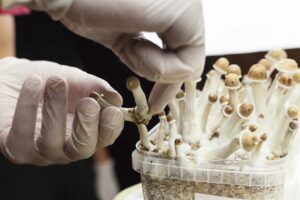Notable Elements
Revival of Psychedelic Research: The resurgence in psychedelic research, particularly with magic mushrooms, signifies a potential shift in mental health treatments, with institutions like Johns Hopkins University leading the way.
Therapeutic Potential of Magic Mushrooms: Psilocybin, the active compound in magic mushrooms, shows significant promise in treating mental health conditions such as depression, anxiety, and PTSD.
Transformative Experiences: Patients undergoing psilocybin therapy often report profound, life-altering experiences that contribute to long-term improvements in mental health.
Mechanism of Psilocybin: Psilocybin’s ability to increase neuroplasticity and activate serotonin receptors in the brain explains its lasting therapeutic effects.
Safety Considerations: While generally safe under medical supervision, magic mushrooms can have side effects, necessitating careful monitoring and screening.
Legal and Ethical Challenges: The current legal classification of psilocybin as a Schedule I drug is a significant hurdle, though this is changing due to mounting scientific evidence of its benefits.
Role of Therapists in Psychedelic Therapy: Therapists play a crucial role in guiding patients through psychedelic experiences, emphasizing psychological support alongside the use of psychedelics.
Personalized Treatment Approaches: The future of psychedelic therapy includes personalized treatments, considering individual patient needs and experiences.
Cultural Shift and Global Impact: There’s a growing cultural acceptance of psychedelics like magic mushrooms, which could lead to global changes in mental health care practices.
A New Era in Mental Health Treatment: The therapeutic use of magic mushrooms heralds a new era in mental health, promising more effective, holistic treatment options and a hopeful future for individuals struggling with mental health disorders.
Introduction
In the ever-evolving field of mental health treatment, the re-emergence of psychedelic therapy, particularly involving magic mushrooms, stands out as a beacon of hope and innovation. This approach, once relegated to the fringes of science, is now being heralded as a potential game-changer in treating a range of mental health disorders. As we delve into this fascinating world, it’s crucial to understand the role magic mushrooms play in shaping the future of psychedelic therapy.
Understanding Magic Mushrooms
Magic mushrooms, scientifically known as ‘Psilocybin mushrooms,’ are a group of fungi that contain psilocybin, a naturally occurring psychedelic compound. Traditionally used in religious and spiritual rituals, these mushrooms have been part of human culture for thousands of years. Modern science, however, has begun to shed light on their potential therapeutic benefits, particularly in treating mental health conditions like depression, anxiety, and PTSD.
The Revival of Psychedelic Research
The 1950s and 1960s saw a surge in psychedelic research, but it came to a halt due to the political and cultural turmoil of the era. Fast forward to the 21st century, and there’s a renewed interest in this field. Leading institutions like Johns Hopkins University and Imperial College London are conducting groundbreaking research, revealing how controlled psychedelic experiences can facilitate profound and lasting mental health benefits.

Magic Mushrooms and Mental Health
Several clinical studies have demonstrated the efficacy of psilocybin in treating depression, anxiety, and other mental health disorders. In these controlled settings, patients often report significant improvements after just one or two sessions. This is particularly promising in the context of treatment-resistant depression, where traditional therapies and medications fail to provide relief.
One of the key benefits of psilocybin therapy is the ‘mystical’ or ‘peak’ experience that many patients report. These experiences, characterized by a profound sense of interconnectedness, insight, and euphoria, can lead to lasting changes in mood, attitude, and behavior.
The Mechanism of Action
Psilocybin works by activating serotonin receptors in the brain, particularly the 5-HT2A receptor. This activation leads to increased neuroplasticity – the brain’s ability to form new neural connections. Researchers believe this could be why psilocybin therapy has such long-lasting effects, even after the drug has left the patient’s system.
Safety and Side Effects
While magic mushrooms are considered relatively safe, especially under medical supervision, there are still risks. The most common side effects include transient anxiety and confusion during the psychedelic experience. Long-term negative effects are rare but can include persistent psychosis and hallucinogen persisting perception disorder (HPPD). Ensuring patient safety involves careful screening for pre-existing mental health conditions and monitoring during the psychedelic experience.
Legal and Ethical Considerations
One of the significant hurdles for psychedelic therapy is the legal status of substances like psilocybin. Currently, in most countries, they are classified as Schedule I drugs, indicating a high potential for abuse and no accepted medical use. However, this classification is increasingly being challenged by the growing body of scientific evidence demonstrating their therapeutic potential.
The Road Ahead: Integration into Mainstream Medicine
The future of psychedelic therapy, including the use of magic mushrooms, is poised at a crucial juncture. The potential for these treatments to revolutionize mental health care is immense. However, this will require a paradigm shift in how we view and regulate psychedelic substances.
The Therapist’s Role
In psychedelic therapy, the role of the therapist is pivotal. Unlike traditional drug treatments for mental health disorders, psychedelic therapy involves carefully guided sessions where therapists help patients navigate their experiences and integrate insights into their daily lives. This form of therapy is as much about the psychological support as it is about the psychedelic experience.

Personalized Medicine
As we better understand the effects of psilocybin, there’s potential for more personalized approaches to treatment. Factors like dosage, setting, and the specific needs and experiences of the patient can all be tailored to optimize therapeutic outcomes.
Expanding the Horizons of Mental Health Treatment
The implications of psychedelic therapy extend beyond individual treatment. It holds the promise of reshaping our broader understanding of mental health care. Traditional treatments often focus on symptom management, primarily through pharmacological interventions and psychotherapy. Psychedelic therapy, on the other hand, offers a more holistic approach. It addresses not just the symptoms but the root causes of mental distress, often leading to transformative experiences that can redefine a person’s perspective and approach to life.
Cultural Shift in Perception
Alongside clinical advancements, there’s a significant cultural shift occurring in how society perceives psychedelic substances like magic mushrooms. The stigma associated with their use is slowly diminishing as more people become aware of their potential benefits. This shift is crucial for the future of psychedelic therapy. As public opinion becomes more accepting, it paves the way for changes in policy and regulation, which in turn can lead to more extensive research and application.
Also Read : Magic Mushrooms for Mental Health: Exploring the Possibilities
The Global Impact
The potential global impact of magic mushrooms in mental health care cannot be overstated. In a world where mental health issues are increasingly prevalent, and where many suffer from conditions inadequately addressed by current treatments, psilocybin therapy offers a beacon of hope. It represents an opportunity to provide effective, lasting relief for millions worldwide.
Embracing a New Era in Healing
As we embrace this new era of psychedelic therapy, it is essential to proceed with caution, ensuring rigorous scientific research, ethical standards, and patient safety. The journey of integrating magic mushrooms into mainstream therapy will undoubtedly be complex. Still, it is a journey filled with potential and promise. With each step forward, we move closer to a future where mental health treatment is more compassionate, more holistic, and more effective, thanks to the remarkable role of magic mushrooms in psychedelic therapy.
Conclusion: A Promising Horizon
The renaissance of psychedelic research, particularly the therapeutic use of magic mushrooms, opens a promising new chapter in mental health treatment. With continued research, legal reforms, and a growing understanding of the intricate workings of the human mind, psilocybin therapy could well become a cornerstone of future mental health care. The path ahead is lined with challenges, but the potential rewards – in terms of lives transformed – are immense. As we stand on the cusp of this new era in mental health treatment, the role of magic mushrooms in the future of psychedelic therapy remains not only intriguing but also fundamentally hopeful.

Hi! I’m Jacob Hawthorne, a passionate medical student dedicated to exploring the fascinating world of psychedelics, particularly magic mushrooms (commonly known as shrooms). With a deep interest in their therapeutic potential and profound effects on the human mind, I aim to provide accurate and evidence-based information about shrooms in the Canadian context.

